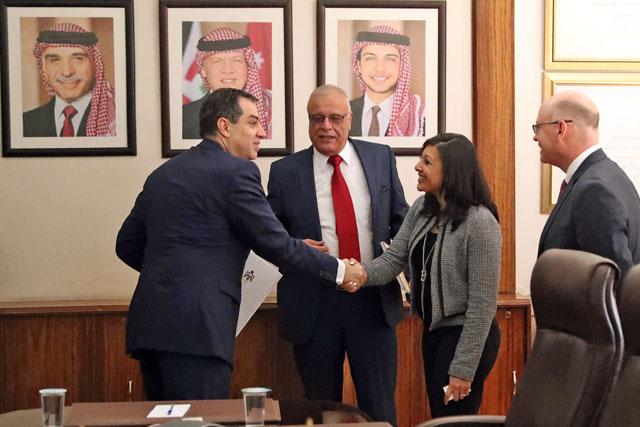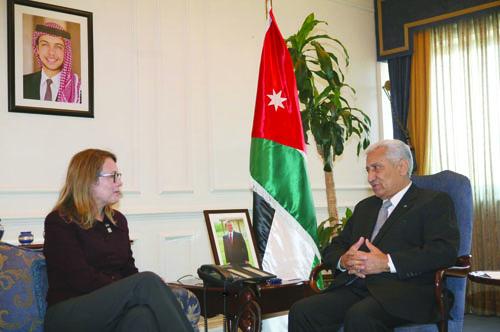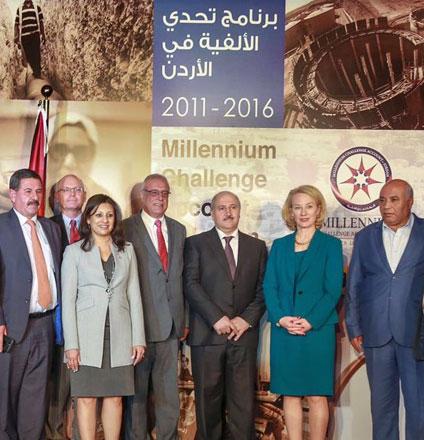You are here
Fakhoury urges MCC to continue support for Jordan after ‘successful’ projects
By JT - Feb 23,2017 - Last updated at Feb 23,2017

Planning and International Cooperation Minister Imad Fakhoury shakes hands with Fatema Sumar, of the Millennium Challenge Corporation, in Amman on Thursday (Photo courtesy of Ministry of Planning and International Cooperation)
AMMAN — Minister of Planning and International Cooperation Imad Fakhoury on Thursday held a meeting with a delegation from the American Millennium Challenge Corporation (MCC).
The delegation, headed by Fatema Sumar, is currently visiting the Kingdom to mark the end of MCC’s projects carried out in Jordan, according to a statement released by the ministry.
Fakhoury expressed Jordan’s appreciation of the US support that comes through different channels, especially the MCC grants that contributed to alleviating the acute water crisis in Jordan.
The two sides discussed fields of cooperation between Jordan and the MCC, and the projects that the corporation helped implement in the water sector, taking into consideration that the Kingdom is one of the poorest countries in water in the world, the statement said.
The minister expressed Jordan’s pride in the success of the projects implemented in the water and wastewater sectors with the support of the MCC, as Jordan received the prize for the best country in implementing MCC-funded projects in 2015.
For her part, Sumar said the MCC projects implemented in the Zarqa Governorate, some 22km northeast of Amman, are a success story in the corporation’s relationship with the Jordanian government.
It is an example of good work and cooperation that the MCC emulates in other countries, she added.
MCC projects implemented in the Kingdom, Sumar reiterated, “are distinct and exceptional compared with MCC projects in other countries”, according to the statement.
They helped make a leap in the water sector of Zarqa, one of the most densely populated governorates in Jordan, she said.
Zarqa is home to around 1.4 million people, according to the 2015 population census.
The minister acquainted the US delegation with the latest developments in Jordan and the continued impact of the protracted Syrian crisis and Syrian refugees on all sectors, including water and wastewater.
He underlined the importance of the international community’s continued support, especially assistance to the budget and grants to implement projects that enhance the resilience of host communities in accordance with the Jordan Response Plan (JRP) 2017-2019.
Jordan’s hosting of over 1.3 million Syrians has grave repercussions on vital sectors, including the water sector, he stressed.
The minister also reviewed the economic and financial challenges that Jordan is facing because of regional circumstances. However, he stressed that Jordan is “adamant on pursuing its economic reforms according to a clear-cut roadmap”.
When considering future grants to urgent projects in the sectors and governorates most affected by the Syrian refugee crisis, he urged the MCC to take into consideration the exceptional circumstances the Kingdom is going through, although it is classified as a middle-income country.
The corporation, Fakhoury added, “should be flexible in implementing the eligibility standards that it adopts with middle-income countries”.
He stressed the government’s keenness on maintaining cooperation with the MCC in the coming years by implementing more projects in the Kingdom.
Jordan, he added, hopes that the success in implementing the previous projects would be a starting point for a larger future cooperation.
The MCC is an independent US foreign aid agency which supports development projects in vital sectors that aim to fight poverty in several countries based on certain standards, according to the statement.
One of the criteria is that the country receiving grants should not be a high middle-income country.
Jordan had succeeded in implementing the MCC standards of good governance and transparency, according to the statement.
In 2006, Jordan received a preliminary grant of $25 million to support democratic institutions and enhance popular participation, transparency and public accountability.
In 2012, the Kingdom received a $275.1 million grant to implement water and wastewater projects in Zarqa, including the second expansion project of the Khirbit Assamra wastewater plant in Hashemiyeh, Zarqa.
The project was a public-private partnership endeavour. The grant also targeted upgrading and rehabilitating water networks.
Related Articles
AMMAN — Prime Minister Abdullah Ensour and US Millennium Challenge Corporation (MCC) CEO Dana J.
AMMAN — After five years and $275 million (JD194.5 million), a US-funded water sanitation project drew to a close on Thursday, leaving behin
AMMAN — Jordan has won the Millennium Challenge Corporation’s (MCC) award for best country in implementing projects from the corporation’s g













